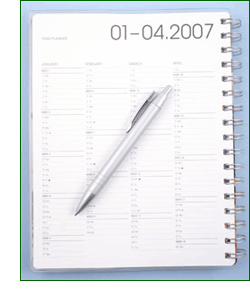Ring in a Money-Savvy 2007:
Seven Smart Suggestions to Get You Started
 What better time to make powerful financial changes than the New Year? A money-savvy 2007 begins with a few smart suggestions.
What better time to make powerful financial changes than the New Year? A money-savvy 2007 begins with a few smart suggestions.
1. Use, don’t lose, those gift cards
Chances are you received at least one gift card this past holiday season – if you did, make sure you spend it. Consumers forget about millions of dollars in unused gift card cash every year. Check your pockets, drawers, wallet… they’re there somewhere.
2. Get your free credit report
Every consumer has the right to view his or her credit report for free once a year. Make January the month you begin monitoring what your creditors are reporting about you. Log onto www.annualcreditreport.com, the one website set up for this purpose. It’s fast and easy.
3. Read all your statements
If you are like most people, you swiped your plastic with greater frequency in November and December than you did in previous months. Increased activity can make it easier to overlook errors and sometimes even fraud, so inspect your statements carefully. Look for double charges, incorrect balances, ATMs or stores you didn’t visit, and unfamiliar accounts. Dispute problems immediately.
4. Benefit from your employee benefits
If you’re an employee, your company probably offers some benefits that can reduce the amount you owe in taxes. You may be able to set aside pretax dollars for health care, dependent care, and all sorts of transportation expenses. Find out what’s available and sign up today. And if your employer matches donations to a 401(k) or 403(b) plan, make this the year you start contributing.
5. Power down your debt
Tried to keep spending in line, but still charged more than you intended? No use fretting about it – do something productive. Add up every penny you owe and make deleting it a priority. Ideally, credit card balances shouldn’t take longer than a few months to repay. Calculate what it will take be debt-free: Credit Card Repayment Calculator.
6. Develop a fresh spending and savings plan
Okay, a budget. But whatever you call it, there is no denying that knowing how much money is coming in and going out is important. Without that information, you can’t effectively plan for the future. So you don’t forget anything, download the Money Management Planner for a comprehensive cash-flow worksheet.
7. Start saving
Do it now. Even if you don’t have a specific goal in mind, saving even a few bucks is an immediate mood booster. If you owe money, put a little aside anyway. Acquiring a savings habit as soon as possible makes sense. Set a little aside each month while paying down your obligations, and you’ll be out of the red and have a little nest egg in place. Make this year your best ever!
